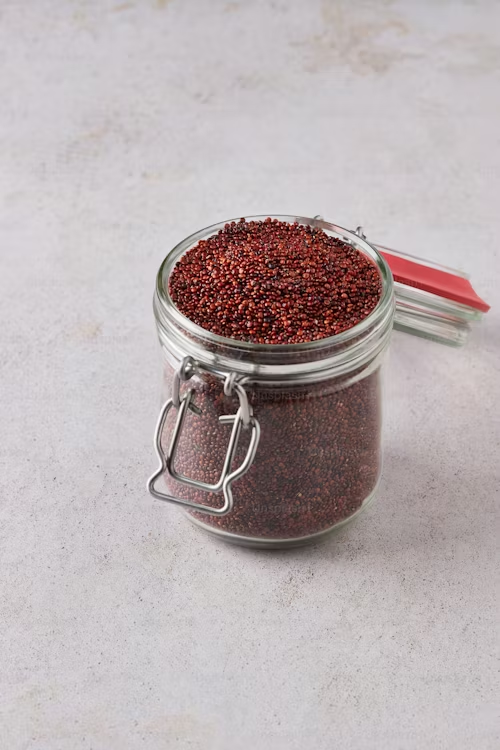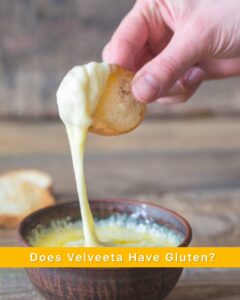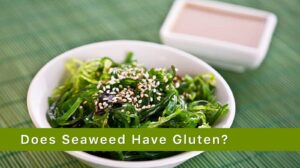Originating from the mustard plant, mustard seeds have long been used in traditional medicine and cooking. These seeds, which are members of the Brassica family, have been grown and treasured for their distinct tastes and versatile uses in a range of culinary arts. Mustard seeds come in a variety of varieties, each having unique qualities and culinary applications. Mustard seeds come in three main varieties: yellow mustard, brown mustard, and black mustard. When preparing prepared mustard, yellow mustard seeds are frequently utilised because of their softer flavour.
With their deeper, more intense flavour, brown mustard seeds are frequently utilised in Asian and Indian cooking. The main application for black mustard seeds, which have a strong spicy flavour, is Indian cookery. But the main question is “Does mustard seed contain gluten?” Continue reading.

Does Mustard Seed Contain Gluten?
Since mustard seeds are inherently gluten-free, eating them is safe for people who have celiac disease or gluten sensitivity.
Particular warning: Use caution when utilising prepared mustard products, such as mustard in sauces, dressings, or condiments, as they can include gluten-containing additional components. It’s best to look for labels that expressly declare their mustard to be gluten-free or to check the product label for any possible gluten-containing substances to be sure that mustard products are completely gluten-free. By doing this, the chance of unintentional gluten intake can be decreased.
What Is Mustard?
Mustard seeds and vinegar are combined to make basic mustard. There are numerous varieties of mustard, allowing for the blending of other components into the sauce. Anything from honey to lemon juice can be added here. There are many more brands of mustard, just like there are several varieties. When purchasing mustard, bear in mind that different brands and flavours will have different ingredients.
Brands Of Gluten Free Mustard
Although many mustard brands ought to be gluten-free, always check this quickly before making a purchase.
- French’s Classic Yellow Mustard & Dijon Mustard
- Sir Kensington’s Mustard
- Boar’s Head Honey Mustard & Yellow Mustard
- Annie’s Horseradish Mustard
- Koops’ Spicy Brown Mustard
- Tessemae’s Organic Dijon Mustard
- Organicville Organic Mustard
- Origin and Types of Mustard Seeds
The mustard plant, a member of the Brassica family, yields mustard seeds. They are extensively grown and have long been utilised for both medicinal and culinary uses. Mustard seeds come in three varieties: yellow, brown, and black. Each has a distinct flavour and uses in cooking.
When preparing prepared mustard, yellow mustard seeds are typically utilised because they have the mildest flavour. Additionally, they are utilised in marinades, salad dressings, and pickling. With their deeper, more intense flavour, brown mustard seeds are frequently utilised in Asian and Indian cooking. They are essential ingredients in curries, chutneys, and spice mixtures. Due to their strong heat, black mustard seeds are mostly utilised in Indian cuisine, particularly in curries, lentils, and pickles.
Nutritional Profile of Mustard Seeds
In addition to being tasty, mustard seeds are a great source of many nutrients that support a balanced diet. They are an excellent source of fibre, vitamins, minerals, protein, and good fats.
Protein is a vital macronutrient that supports a number of body processes and is needed for the development and repair of tissues. Given their high protein content, mustard seeds are a great complement to vegetarian and vegan diets.
Another valuable ingredient in mustard seeds is fibre, which promotes good digestion and intestinal function. It prevents constipation by giving the stool more volume. This encourages regular bowel movements.
Omega-3 fatty acids and other beneficial fats can be found in mustard seeds. These fats are well-known for their heart-healthy properties, which include raising cholesterol and lowering inflammation.
Mustard seeds provide a variety of vitamins and minerals along with protein, fibre, and good fats. Their high content of antioxidants helps shield the body from damaging free radicals and oxidative stress. Potential health advantages of mustard seeds include lowering inflammation, facilitating digestion, and supporting heart health.
All things considered, mustard seeds are a flexible component that offer a variety of nutritional advantages in addition to flavouring food. Mustard seeds are a great addition to any kitchen pantry, whether you plan to use them for cooking or are interested in learning more about their possible health advantages.
Check out this Indian Potatoes with Black and Yellow Mustard Seeds recipe.
Mustard Seed and Gluten

With our newfound knowledge of gluten and mustard seeds, let’s investigate whether or not mustard seeds are safe for those with gluten-related diseases to eat.
Processing of Mustard Seeds
In their natural state, mustard seeds don’t contain gluten. But cross-contamination with gluten-containing substances might happen while processing and producing items containing mustard seed. Therefore, when buying items containing mustard seeds, it is essential to thoroughly check the manufacturing techniques and labels.
After being harvested, mustard seeds go through a number of processing stages to generate the mustard products that are typically found in supermarkets. These stages involve washing, drying, and either crushing or grinding the seeds to make mustard paste or powder. If the grains are handled in the same facility or on shared equipment, the mustard seeds may come into touch with gluten-containing cereals like wheat, barley, or rye during these procedures.
Another crucial stage where cross-contamination can happen is during storage. Large silos or other storage containers are frequently used to store mustard seeds, and if these containers have previously held gluten-containing grains, there is a chance of cross-contamination.
Gluten particles may also be present in products made with mustard seeds if equipment or storage facilities are not cleaned properly.
Following processing and packaging, the mustard seeds are labelled with their gluten content. It’s important to carefully read these labels since some items may be labelled as “gluten-free,” meaning that their gluten content has been tested and certified to be less than 20 parts per million (ppm), which is the limit in many countries for gluten-free certification. There is a greater chance of cross-contamination with other items that bear warnings like “may contain gluten” or “processed in a facility that also handles gluten.”
Potential Cross-Contamination Risks
Cross-contamination can occur in a number of production steps, including harvesting, storing, and packing. It is especially important for people who have severe gluten sensitivity or celiac disease to be aware of these hazards and select gluten-free goods.
Cross-pollination may occur during the harvesting process if the fields where mustard seeds are planted are close to fields of grains that contain gluten. This implies that insects or the wind may carry gluten particles from nearby crops and contaminate mustard seeds. Farmers may use strategies like buffer zones between crops or precise scheduling of crop planting and harvesting to lower the possibility of cross-contamination to lessen this danger.
Storage facilities are essential for avoiding cross-contamination as well. To prevent gluten crumbs from finding their way into mustard seed products, grains must be properly separated from one another and storage containers must be cleaned thoroughly.
To reduce the possibility of cross-contamination, some producers might even have warehouses or storage spaces exclusively for gluten-free goods.
When it comes to packing, producers must make sure that all gluten residue has been removed from and that the machinery used to package mustard seed goods has been well cleaned. To avoid cross-contamination, they might also employ distinct packing lines for gluten-free goods or strictly enforce cleaning procedures in between product runs.
It is significant to remember that different manufacturers and brands may have varying levels of cross-contamination risk. While some businesses might take less severe precautions, others might have more rigorous systems in place to reduce the danger. Those who suffer from gluten-related diseases must thus do their homework and select brands that prioritise gluten-free practices and have credible certifications.
Gluten-Free Alternatives to Mustard Seed
If someone has a gluten sensitivity and must avoid mustard seeds, there are a number of gluten-free substitutes that can still give their food a zesty, savoury kick.

Gluten-Free Spices and Condiments
Numerous seasonings and sauces are inherently gluten-free. Turmeric, paprika, cumin, and apple cider vinegar are a few examples. These can be used in a variety of recipes in place of mustard seeds.
Reading Labels for Gluten Content
The labels on spices and condiments should be carefully examined before purchase. To make sure a product is safe to eat, look for a label that states it is gluten-free. It is mandatory for manufacturers to identify on their labels any possible sources of gluten.
If you can safely eat mustard seeds, adding them to a gluten-free diet can be a great way to bring out the flavours in your food. Moreover, many Indian dishes include black mustard to add flavors in them.
You may use mustard seeds (for example- black mustard or yellow mustard) as a spice in a variety of recipes, including marinades, sauces, and dressings. They can improve the flavour of food by adding a distinct texture and flavour. To maintain a well-balanced gluten-free diet, it is important to make sure that the other ingredients in the dish are likewise free of gluten.
The Things to Watch Out for When Using Mustard Seed
Purchasing mustard seed from reliable suppliers is crucial for reducing the possibility of cross-contamination. Furthermore, to avoid any possible hazards, people with extreme gluten sensitivity could find it helpful to utilise mustard seed in its pure form instead of processed items.

Conclusion
By now, you can answer the question “Does mustard seed have gluten?” In conclusion, there is a chance of cross-contamination during processing even if mustard seeds don’t contain gluten. As a result, people who suffer from gluten-related problems ought to exercise caution and select goods that have been certified gluten-free. Mustard seeds can bring taste and nutrition to a gluten-free diet for people who can eat them safely. Always remember to read labels carefully and seek medical advice if you have any questions or concerns about your unique dietary requirements.
Check out other posts:
Does Caesar Dressing Have Gluten? Easy Tips To Order Gluten-free Caesar Salad







